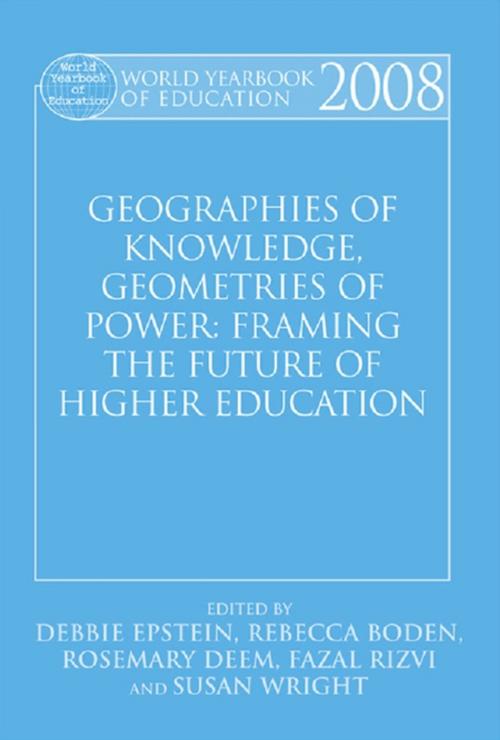World Yearbook of Education 2008
Geographies of Knowledge, Geometries of Power: Framing the Future of Higher Education
Nonfiction, Reference & Language, Education & Teaching, Reference, Higher Education| Author: | ISBN: | 9781135892449 | |
| Publisher: | Taylor and Francis | Publication: | January 11, 2013 |
| Imprint: | Routledge | Language: | English |
| Author: | |
| ISBN: | 9781135892449 |
| Publisher: | Taylor and Francis |
| Publication: | January 11, 2013 |
| Imprint: | Routledge |
| Language: | English |
This volume examines higher education in globalized conditions through a focus on the spatial, historic and economic relations of power in which it is embedded. Distinct geometries of power are emerging as the knowledge production capability of universities is increasingly globalized. Changes in the organization and practices of higher education tend to travel from the ‘West to the rest’. Thus, distinctive geographies of knowledge are being produced, intersected by geometries of power and raising questions about the recognition, production, control and usage of university-produced knowledge in different regions of the world.
What flows of power and influence can be traced in the shifting geographies of higher education? How do national systems locate themselves in global arenas, and what consequences does such positioning have for local practices and relations of higher education? How do universities and university workers respond to the increasing commodification of knowledge? How do consumers of knowledge assess the quality of the ‘goods’ on offer in a global marketplace?
The 2008 volume of the World yearbook addresses these questions, highlighting four key areas:
- Producing and Reproducing the University— How is the university adapting to the pressures of globalization?
- Supplying Knowledge—What structural and cultural changes are demanded from the university in its new role as a free market supplier of knowledge?
- Demanding Knowledge—Marketing and Consumption—How can consumers best assess the quality of education on a global scale?
- Transnational Academic Flows—What trends are evident in the flow of students, knowledge and capital, with what consequences?
The 2008 volume is interdisciplinary in its approach, drawing on scholarship from accounting, finance and human geography as well as from the field of education. Transnational influences examined include UNESCO and OECD, GATS and the effects of digital technologies. Contrasting contexts include Central and Eastern Europe, Finland, China and India and England.
With its emphasis on the interrelationship of knowledge and power, and its attention to emergent spatial inequalities, Geographies of Knowledge, Geometries of Power: Framing the Future of Higher Education provides a rich and compelling resource for understanding emergent practices and relations of knowledge production and exchange in global higher education.
This volume examines higher education in globalized conditions through a focus on the spatial, historic and economic relations of power in which it is embedded. Distinct geometries of power are emerging as the knowledge production capability of universities is increasingly globalized. Changes in the organization and practices of higher education tend to travel from the ‘West to the rest’. Thus, distinctive geographies of knowledge are being produced, intersected by geometries of power and raising questions about the recognition, production, control and usage of university-produced knowledge in different regions of the world.
What flows of power and influence can be traced in the shifting geographies of higher education? How do national systems locate themselves in global arenas, and what consequences does such positioning have for local practices and relations of higher education? How do universities and university workers respond to the increasing commodification of knowledge? How do consumers of knowledge assess the quality of the ‘goods’ on offer in a global marketplace?
The 2008 volume of the World yearbook addresses these questions, highlighting four key areas:
- Producing and Reproducing the University— How is the university adapting to the pressures of globalization?
- Supplying Knowledge—What structural and cultural changes are demanded from the university in its new role as a free market supplier of knowledge?
- Demanding Knowledge—Marketing and Consumption—How can consumers best assess the quality of education on a global scale?
- Transnational Academic Flows—What trends are evident in the flow of students, knowledge and capital, with what consequences?
The 2008 volume is interdisciplinary in its approach, drawing on scholarship from accounting, finance and human geography as well as from the field of education. Transnational influences examined include UNESCO and OECD, GATS and the effects of digital technologies. Contrasting contexts include Central and Eastern Europe, Finland, China and India and England.
With its emphasis on the interrelationship of knowledge and power, and its attention to emergent spatial inequalities, Geographies of Knowledge, Geometries of Power: Framing the Future of Higher Education provides a rich and compelling resource for understanding emergent practices and relations of knowledge production and exchange in global higher education.















